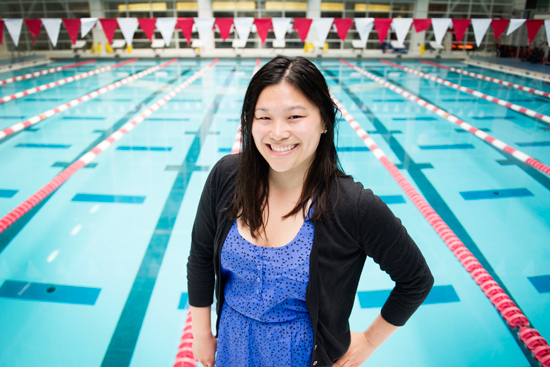More Than Half of Americans Could Drown. Are you one?
FitRec instructors offer swimming lessons for all ages

FitRec aquatics manager Michelle Wong and her staff teach hundreds of BU community members how to swim. Photo by Jackie Ricciardi
In this community of scholars and increasingly gifted students, there is one skill that hundreds haven’t mastered: how to swim.
They’re far from alone. The summer swim season arrived with news from the Red Cross that more than half of Americans either can’t swim or don’t swim well enough to do every one of five lifesaving skills: float or tread water for one minute, swim one pool length without pausing, jump into deep water and come up for air, exit a pool without a ladder, and spin around in water and then find their way to the surface.
The news doesn’t surprise Michelle Wong, aquatics manager at BU’s Fitness & Recreation Center, whose staff includes about 30 swim instructors during the summer (that swells to 40 during the academic year). She estimates that last year alone, more than 200 students and BU staff took swimming lessons at FitRec. Lessons are available to children and adults, be they BU community members or not, and public, semiprivate, or private classes are offered. BU students may take lessons that confer one physical education credit. Given that drowning is often a silent death that even nearby adults fail to notice, that’s a potentially lifesaving credit.
Wong spoke with BU Today about the Red Cross survey, its applicability to the University, and whether BU should join the minority of American universities that require a swim test for graduation.
BU Today: Were you surprised by the Red Cross survey results?
Wong: I wasn’t surprised. It says that more than 50 percent don’t know the basics; it’s been like that for a long time. It is important for people to learn how to swim. If you’re out on a beach or on a cruise, you never know what will happen. These basic skills are the fundamentals any individual should know.
I’ve been here since October, and the majority of participants in our adult instruction programming are students who don’t know how to swim. Of all our courses—beginning swim, stroke improvement, fitness swim—beginning swim is the one that usually fills up the quickest, with BU students, staff, or alumni. In our beginning swim classes, I’ve seen them start from scratch, where they don’t know how to swim, and at the end of the semester, they’re swimming in the dive area, 13 feet deep. It’s not a guarantee that they’ll know how to swim in three months; it really depends on the individual.
Why have some adults never learned to swim?
Maybe they experienced a fear of water at some point—they almost drowned. Or they feel, “I don’t want to get into the water if my kid sees that I fear the water.”
A person might be embarrassed to admit that he or she doesn’t know how to swim. Do you worry there might be a stigma?
A lot of our youth programs are at max capacity. Our adult ones—I would not say we’re never at max capacity, but there’s always room to grow an adult program. I don’t think people are embarrassed that they don’t know how to swim. It’s really a question of putting in the time and effort. You have to come, you have to get dressed; after your lesson, you have to shower. Instead of a 45-minute workout, it’s like an hour and half, two hours. In some of our programs, we’ll have a full class at the beginning of the year, and people will start to dwindle away after half the class.
Do you think BU should require students to prove they can swim as a condition for getting their degree?
Honestly, I’m indifferent. If they really want to learn to swim, we have these programs that we’re offering. I’ve seen people who are just not comfortable at all in the water, even if they’ve had swim lessons before. Some people just can’t get over the fear of it. So I don’t want to force somebody to take the swim test if they just can’t do it. If they don’t pass and have to take a course for their first semester, it’s not guaranteed that they’ll learn to swim, because people progress differently.
FitRec offers five 30-minute lessons for $175 for members, $210 for nonmembers. Register here. Find information about private lessons here.
This article was originally published June 12, 2014.
Comments & Discussion
Boston University moderates comments to facilitate an informed, substantive, civil conversation. Abusive, profane, self-promotional, misleading, incoherent or off-topic comments will be rejected. Moderators are staffed during regular business hours (EST) and can only accept comments written in English. Statistics or facts must include a citation or a link to the citation.